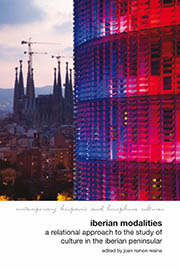Book contents
- Frontmatter
- Contents
- Preface
- List of Contributors
- Introduction: Iberian Modalities: The Logic of an Intercultural Field
- Part I Institutionalizing Iberian Studies: A Change of Paradigm
- Part II Theorizing Iberia
- Part III Iberian Dialogs
- 8 Asymmetry and the Political: Paradigms for a Cultural History of the Iberian Twentieth Century
- 9 Sins of the Flesh: Bullfighting as a Model of Power
- 10 Jews and Jewishness in Carme Riera's Dins el darrer blau
- 11 Mediterranean Exemplarities: The Case of Medieval Iberia
- Part IV From Sea to Iberian Sea
- Works Cited
- Index
11 - Mediterranean Exemplarities: The Case of Medieval Iberia
from Part III - Iberian Dialogs
- Frontmatter
- Contents
- Preface
- List of Contributors
- Introduction: Iberian Modalities: The Logic of an Intercultural Field
- Part I Institutionalizing Iberian Studies: A Change of Paradigm
- Part II Theorizing Iberia
- Part III Iberian Dialogs
- 8 Asymmetry and the Political: Paradigms for a Cultural History of the Iberian Twentieth Century
- 9 Sins of the Flesh: Bullfighting as a Model of Power
- 10 Jews and Jewishness in Carme Riera's Dins el darrer blau
- 11 Mediterranean Exemplarities: The Case of Medieval Iberia
- Part IV From Sea to Iberian Sea
- Works Cited
- Index
Summary
Many an age has imagined itself through a sea. The ancients lived “like frogs around a pond,” as Aristophanes famously put it, while the Jesuits divided the seventeenth-century world into the Indies of “over there” and “over here.” After 1945 it was NATO and “Atlantic studies” that animated studies unified by a geographic concept based on a body of water, until the rise of China put wind into the sails of the “Pacific rim.” Today the “Union for the Mediterranean,” with its 43 member states (including such Mediterranean lands as Estonia, Ireland, and Sweden) and accompanying plethora of books and conferences, suggest that the Mediterranean is acquiring a new exemplarity, of which this essay will explore one aspect: the modern exemplarity of the medieval Mediterranean, and especially its Iberian shores.
I mean this term “exemplarity” in the medieval sense of exemplum, or morally instructive narrative: in this case, the morally instructive narratives (the plural is deliberate) being our histories of Iberia. We can all think of examples of such exemplarities. Perhaps the best known is convivencia, a positively valorized way of representing the relatively peaceful coexistence of Christianity, Islam, and Judaism in the Iberian peninsula. Convivencia began to flourish in academic circles more or less simultaneously with decolonization and (in Spain) the waning decade of the Franco dictatorship, and has received renewed attention in recent years as the Muslim world and the Middle East have moved toward the center of the geopolitical stage (witness the recent establishment of “Convivencia: representations, knowledge and identities, 500–1600 AD,” a joint research initiative of the Max Planck Gesellschaft and Spain's Consejo Superior de Investigaciones Cientificas).
- Type
- Chapter
- Information
- Iberian ModalitiesA Relational Approach to the Study of Culture in the Iberian Peninsula, pp. 178 - 194Publisher: Liverpool University PressPrint publication year: 2013



